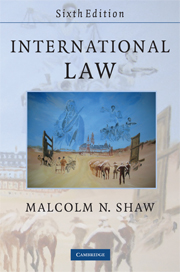Book contents
- Frontmatter
- Contents
- Preface
- Table of cases
- Table of treaties and selected other international instruments
- List of abbreviations
- 1 The nature and development of international law
- 2 International law today
- 3 Sources
- 4 International law and municipal law
- 5 The subjects of international law
- 6 The international protection of human rights
- 7 The regional protection of human rights
- 8 Individual criminal responsibility in international law
- 9 Recognition
- 10 Territory
- 11 The law of the sea
- 12 Jurisdiction
- 13 Immunities from jurisdiction
- 14 State responsibility
- 15 International environmental law
- 16 The law of treaties
- 17 State succession
- 18 The settlement of disputes by peaceful means
- 19 The International Court of Justice
- 20 International law and the use of force by states
- 21 International humanitarian law
- 22 The United Nations
- 23 International institutions
- Some useful international law websites
- Index
17 - State succession
Published online by Cambridge University Press: 05 June 2012
- Frontmatter
- Contents
- Preface
- Table of cases
- Table of treaties and selected other international instruments
- List of abbreviations
- 1 The nature and development of international law
- 2 International law today
- 3 Sources
- 4 International law and municipal law
- 5 The subjects of international law
- 6 The international protection of human rights
- 7 The regional protection of human rights
- 8 Individual criminal responsibility in international law
- 9 Recognition
- 10 Territory
- 11 The law of the sea
- 12 Jurisdiction
- 13 Immunities from jurisdiction
- 14 State responsibility
- 15 International environmental law
- 16 The law of treaties
- 17 State succession
- 18 The settlement of disputes by peaceful means
- 19 The International Court of Justice
- 20 International law and the use of force by states
- 21 International humanitarian law
- 22 The United Nations
- 23 International institutions
- Some useful international law websites
- Index
Summary
Political entities are not immutable. They are subject to change. New states appear and old states disappear. Federations, mergers, dissolutions and secessions take place. International law has to incorporate such events into its general framework with the minimum of disruption and instability. Such changes have come to the fore since the end of the Second World War and the establishment of over 100 new, independent countries.
Difficulties may result from the change in the political sovereignty over a particular territorial entity for the purposes of international law and the world community. For instance, how far is a new state bound by the treaties and contracts entered into by the previous sovereign of the territory? Does nationality automatically devolve upon the inhabitants to replace that of the predecessor? What happens to the public property of the previous sovereign, and to what extent is the new authority liable for the debts of the old?
State succession in international law cannot be confused with succession in municipal law and the transmission of property and so forth to the relevant heir. Other interests and concerns are involved and the principles of state sovereignty, equality of states and non-interference prevent a universal succession principle similar to domestic law from being adopted. Despite attempts to assimilate Roman law views regarding the continuity of the legal personality in the estate which falls by inheritance, this approach could not be sustained in the light of state interests and practice.
- Type
- Chapter
- Information
- International Law , pp. 956 - 1009Publisher: Cambridge University PressPrint publication year: 2008



